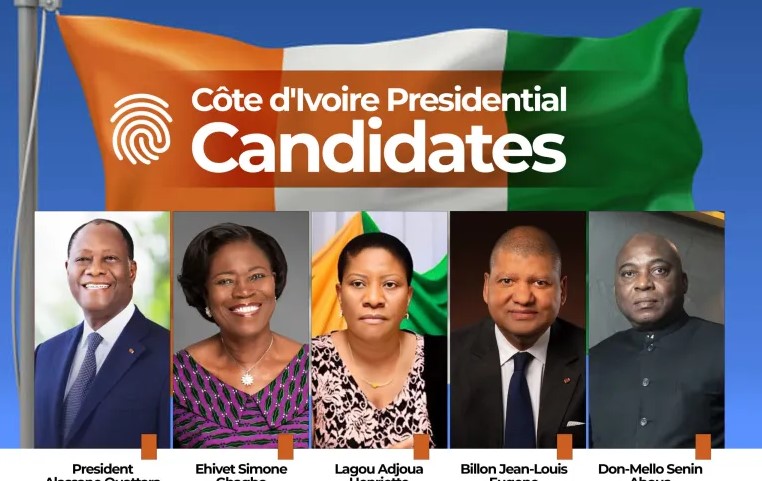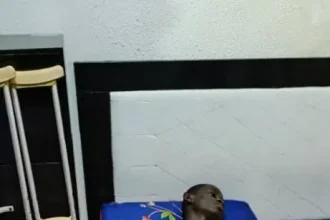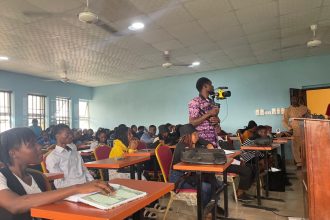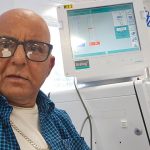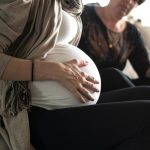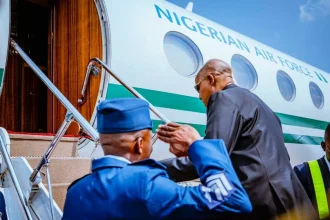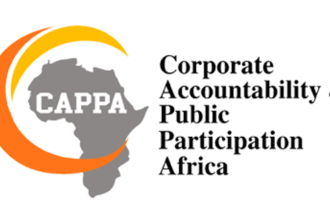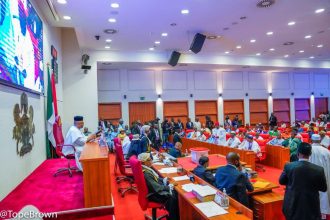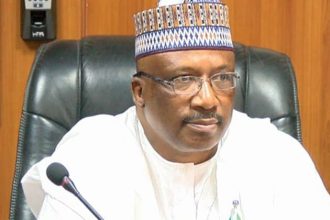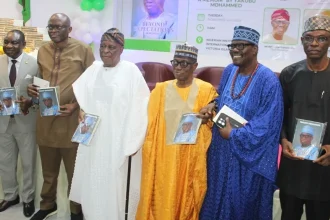The Republic of Côte d’Ivoire, commonly known as the Ivory Coast, is a West African nation along the Gulf of Guinea.
Bordered by Guinea and Liberia to the west, Mali and Burkina Faso to the north, Ghana to the east, and the Atlantic Ocean to the south, the country occupies a land area of approximately 322,463 square kilometres.
Its political capital is Yamoussoukro, while Abidjan serves as the economic capital and largest city. Côte d’Ivoire gained independence from France on August 7, 1960, and has since maintained French as its official language.
However, over 70 local languages are widely spoken, including Baoulé, Dioula, Dan, Anyin, and Cebaara Senufo. The country’s population is estimated at 26.3 million, with diverse religious affiliations including Islam, Christianity, and indigenous beliefs. The national currency is the West African CFA franc. Côte d’Ivoire is a member of the Economic Community of West African States (ECOWAS).
Following years of political instability and two civil conflicts in 2002 and 2011, Côte d’Ivoire has made significant progress toward political stabilisation and economic growth. The 2016 Constitution, approved through a national referendum, introduced notable reforms designed to enhance democratic governance, protect human rights, and promote decentralisation. These reforms marked an important milestone in the country’s post-conflict democratic consolidation efforts.
Despite these advances, Côte d’Ivoire continues to face challenges that test the resilience of its democratic institutions.
The country has yet to witness a peaceful transfer of executive power since independence, and lingering political, regional, and ethnic divisions remain key sources of tension. Additionally, growing public dissatisfaction with the political process, concerns about electoral credibility, and persistent gender inequality pose risks to inclusive and transparent governance.
As the nation approaches a new electoral cycle, Côte d’Ivoire is preparing for a series of critical polls: the presidential election in 2025, National Assembly elections in 2026, and municipal, regional, and Senate elections in 2028. These elections will be pivotal in shaping the future of the Ivorian state and consolidating democratic governance.
At stake in the upcoming presidential election is the Presidency of Côte d’Ivoire, currently held by President Alassane Ouattara, who has been in office since December 2010.
The country operates under a semi-presidential system with a bicameral Parliament, comprising the Senate (99 seats) and the National Assembly (255 seats). The President is directly elected by plurality vote to a renewable five-year term, while the Prime Minister is appointed by the President.
Côte d’Ivoire’s last presidential election in 2020 saw President Ouattara re-elected with 94% of the vote, in a contest marked by a 54% voter turnout and boycotts by major opposition parties. In the forthcoming 2025 election, major political contenders include Alassane Ouattara (RHDP), Cheick Tidjane Thiam (PDCI-RDA), and Pascal Affi N’Guessan (FPI).
The country’s registered voters number approximately 8.7 million, out of a projected 2024 population of 31.9 million. Côte d’Ivoire has taken steps to advance women’s political participation, with a 30% gender quota for legislative nominations and 13% representation in the National Assembly before the election.
The country has ratified major international conventions, including the Convention on the Elimination of All Forms of Discrimination Against Women (CEDAW) and the Convention on the Rights of Persons with Disabilities (CRPD).
Côte d’Ivoire’s Human Development Index (HDI) stands at 0.582 (ranked 157 globally, 2023), reflecting moderate progress in socioeconomic development. However, ongoing disparities in gender equality, regional inclusion, and access to political participation underscore the need for sustained democratic reforms as the nation prepares for its next electoral chapter.
Regions
are 31 regions and two autonomous districts – Yamoussoukro, the political capital, and Abidjan, the commercial capital.
The Legal Framework Governing the Electoral Process in Côte d’Ivoire
The electoral process in Côte d’Ivoire is governed by a comprehensive legal framework designed to ensure that elections are conducted in a manner that is universal, free, equal, and secret. At the core of this framework is the Electoral Code 2020.
The Code provides for guarantees that every Ivorian citizen of voting age can participate in the electoral process, provided they are registered on the electoral roll and thoroughly enjoy their civil and political rights (Articles 2–3). This right extends to Ivorians residing abroad, who may vote if registered with a diplomatic or consular mission, under conditions established by the Council of Ministers upon the proposal of the Commission responsible for elections.
While suffrage is universal, the law also sets out apparent limitations to ensure the integrity of the electorate. Individuals convicted of felonies, imprisoned for certain serious crimes, undischarged bankrupts, fugitives, those under legal guardianship, or those deprived of voting rights by judicial decision are ineligible to vote (Article 4).
Voter eligibility is formally established through registration on the electoral roll, which is both a permanent and public administrative document, updated annually to reflect changes in the electorate (Articles 5–6). The electoral roll contains detailed personal information, including biometric data such as fingerprints, ensuring accurate identification of voters (Article 7).
Registration is strictly limited to one district per voter, with penalties for fraudulent registration (Articles 9–10).
The framework also outlines the rules for candidate eligibility and ineligibility. Any registered voter may stand as a candidate, subject to the specific requirements for each election.
For presidential elections, candidates must be at least thirty-five years old, hold full civil and political rights, and be exclusively Ivorian by birth, born of a father or mother who is Ivorian by origin (Articles 43–44).
Certain officeholders, such as members of the Constitutional Council, judiciary, civil service, and military personnel, are prohibited from candidacy during their tenure and for six months afterward (Article 50).
Candidates must submit a declaration of candidacy, supported by sponsorship from registered voters representing at least one percent of the local electorate in half of the autonomous districts and regions, and accompanied by official documents proving identity, nationality, and legal compliance (Articles 51–54).
Preparatory operations for elections are clearly regulated. The electoral college is convened by decree, and polling stations are established in each administrative district, commune, and select diplomatic or consular representations.
Each station accommodates a maximum of six hundred voters and is located in public or requisitioned premises (Articles 20–21). Candidate declarations must be accompanied by a monetary deposit, refunded under specified conditions, while campaign regulations ensure equal access to official media and prohibit the use of government resources for electoral purposes (Articles 24–31).
Voting procedures are designed to be transparent and inclusive. Voting occurs on a single designated day, with accommodations for voters with disabilities, and requires presentation of valid identification (Articles 33–37).
Voting is conducted using a single ballot paper, and voters mark their choice in secret. Polling station officials, including candidate representatives, oversee the process to ensure fairness and accountability (Articles 35, 37). The counting of votes takes place immediately after polls close.
Results are recorded in detailed reports that include objections and disputes, which are transmitted to the Commission for collation and provisional announcement (Articles 39, 58–59).
The resolution of electoral disputes is also carefully regulated. Candidates may contest election results through written petitions to the Constitutional Council within five days of provisional results.
The Council reviews complaints within seven days and may reject petitions that are clearly inadmissible or without impact. The final proclamation of the presidential election results is made by the Constitutional Council, ensuring legal certainty and legitimacy (Articles 60–63).
Specific provisions govern the presidential election, emphasising transparency, continuity, and stability. The President is elected by direct universal suffrage for a five-year term and may be re-elected once.
Elections require an absolute majority in the first round, with a runoff between the top two candidates if no majority is achieved. Provisions exist to address candidate incapacity, death, or serious incidents such as natural disasters or threats to territorial integrity, ensuring the electoral process can adapt to unforeseen circumstances while maintaining constitutional order (Articles 43–47).
In conclusion, the Ivorian legal framework provides a robust and structured approach to elections, safeguarding the principles of universal, free, equal, and secret suffrage.
By regulating voter eligibility, candidate requirements, campaign conduct, voting operations, result announcements, and dispute resolution, the law aims to ensure that elections are conducted fairly, transparently, and inclusively, thereby reinforcing democratic governance in Côte d’Ivoire.
Registered Voters A total of 8,727,431 registered voters in Cote d’Ivoire and abroad will be heading to the polls. Côte d’Ivoire allows for diaspora voting for its elections.
Election Commission
The Independent Electoral Commission (CEI) was created under the 2000 Constitution and came into being in 2001. The 2016 Constitution provides that the CEI is responsible for the organisation of the referendum, presidential, legislative, and local elections. The Independent Electoral Commission comprises a Central Commission and Local Commissions.
The Commission has eight members, headed by a President. There are 4 Vice Presidents, a Secretary, and two Deputy Secretaries. The members of the CEI are appointed by Presidential decree upon proposals from institutions, political parties, parliament, various ministries, among others. The present President is Mr. Coulibaly Kuibiert Ibrahime.
Candidates for Presidential Elections
Article 43 of the Electoral Code states that a candidate for the presidential election must be at least thirty-five years of age, exclusively of Ivorian nationality, and born of a father or mother who is Ivorian by origin. It is under the citizenship provision that Tidjane Thiam, who was seen as the leading opposition candidate, was disqualified because of his French dual citizenship.
The Constitutional Council cleared five candidates to contest for the Presidential Elections after receiving proposals from 60 persons. In accordance with Decree No. 2025-649 of July 30, 2025, which sets the duration of the 2025 presidential electoral campaign, the campaign commenced at midnight on Friday, October 10, 2025. It will conclude at midnight on Thursday, October 23, 2025, lasting a total of fourteen days.
1. President Alassane Ouattara is the incumbent president, having been in office since 2011.
After Ouattara won the 2010 elections, Laurent Gbagbo refused to step down, leading to a political crisis that lasted until 2011, when the Constitutional Council declared Ouattara the winner.
He was subsequently sworn in. He was reelected in 2015 and 2020. Alassane Ouattara was born in Dimbokro, Côte d’Ivoire, in 1942.
The candidate of the Rally of Houphouëtists for Democracy and Peace (RHDP) holds a Bachelor’s degree and a Master’s and PhD in economics from the Drexel Institute of Technology and the University of Pennsylvania, respectively.
His distinguished career includes serving as an economist at the International Monetary Fund (IMF), Governor of the Central Bank of West African States (BCEAO), and Prime Minister, before he was elected President of Côte d’Ivoire in 2010.
2. Ehivet Simone Gbagbo was Côte d’Ivoire’s first lady from 2000 to 2011.
She has been active in the political and trade union movements since the 1970s. She was also very active during her husband’s tenure.She has been dubbed the ‘iron lady’ or Hillary Clinton of the tropics. Born in 1942, Gbagbo has a degree in history and linguistics and has been a teacher.
In 2012, the International Criminal Court issued a warrant for her arrest for crimes against humanity, stating that she had played a central role in the 2010 post-election violence as a result of her role in her husband’s government.
The Ivorian government refused to hand her over to the ICC and instead prosecuted her, and she was sentenced to 20 years in prison for the offence of crimes against humanity. She was acquitted in 2017 by another Ivorian court and also pardoned by President Ouattara in 2018. She is the candidate of the Movement of Capable Generations (MGC)
3. Lagou Adjoua Henriette, the candidate of the Political Partners for Peace coalition (GP-Paix coalition), was born on June 22, 1959.
Lagou contested the 2015 Presidential elections, where she came fourth with 27,759 votes, which is about 0.89% of the ballots .
Lagou has presented herself as the centrist President. She is a former Minister of Social Affairs. Her candidacy is focused on peace and reconciliation.
4. Billon Jean-Louis Eugene is the candidate of the Democratic Congress (CODE), a coalition of 18 political parties and political movements.
Billon is a former trade minister. He is running on promises to crack down on corruption and promote private sector investments.
Billon was born on 8th December 1964. He has two Master’s degrees in Law and Management.
READ ALSO: Grey List Exit: FATF President congratulates Nigeria
5. Don-Mello Senin Ahoua was born on June 23, 1958. He is a teacher, researcher, and engineer.
After completing his secondary education and earning a baccalaureate from Lycée Classique de Bouaké, he pursued higher studies at the Félix Houphouët-Boigny National Polytechnic Institute (INPHB) in Yamoussoukro.
In 1982, he graduated with a degree in engineering from the National School of Public Works (ENSTP) and obtained a doctorate in 1985.


